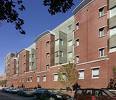Public Educated About Strokes Through New York Methodist Hospital Program
by
Joan Trombetti, Writer | May 27, 2008

New York Methodist Hospital
While the effects of stroke can be debilitating, this serious health condition is often preventable or treatable. In order to educate the public about stroke prevention and detection, New York Methodist Hospital (NYM) recently hosted a free Stroke Alert Day.
"Many strokes are preventable, and education is the first step to preventing a stroke," said Cary Buckner, M.D., vice chairman of the department of neurosciences at NYM. "Through Stroke Alert Day, NYM aimed to increase public awareness of risk factors that lead to stroke, stroke symptoms, and what to do if you or a loved one is experiencing these symptoms."
A stroke occurs when a blood vessel or artery that carries blood and oxygen to the brain becomes blocked or when the blood vessel or artery bursts. Although strokes occur suddenly, usually one or more warning signs will signal an impending stroke. These warning signs include numbness, weakness or paralysis of the face, arm or leg on one side, a sudden and severe decline in consciousness, difficulty understanding or speaking, sudden, severe headache, blurred or decreased vision, loss of balance, dizziness, and vomiting.
If you or a family member experiences any of these warning signs, it's vital to immediately go to an emergency department. The longer that brain cells are deprived of oxygen during a stroke, the greater the risk of brain damage. And in some cases, if certain medication is administered immediately, brain damage can be prevented.
At New York Methodist Hospital's Stroke Emergency Center, physicians who are board certified in emergency medicine and trained in neurological emergencies immediately see patients with stroke symptoms. A state-of-the-art spiral CT scanner produces almost immediate images that provide physicians with information about whether a stroke has occurred and which treatment is best. New York Methodist Hospital recently won a Performance Achievement Award from the American Stroke Association for stroke treatment.
"Since treatment for stroke is most effective if it is initiated within hours of the start of symptoms, it's vital to seek care as soon as you think that you might be experiencing a stroke," said Miran Salgado, M.D., chairman of the department of neurosciences and director of NYM's stroke program. "NYM's recent achievement award shows that our Stroke Emergency Center is fully equipped to diagnose conditions quickly, and that our physicians are highly skilled at determining the best course of treatment in the most efficient way possible."
For more information about stroke education, prevention and treatment at New York Methodist Hospital, please call 718-780-5367.
New York Methodist Hospital, a voluntary, acute-care teaching facility located in Brooklyn's Park Slope, houses 651 inpatient beds (including bassinets) and provides services to over 32,000 inpatients each year. An additional 350,000 outpatient visits and services are logged annually. The Hospital offers Institutes in the following areas: Advanced and Minimally Invasive Surgery, Asthma and Lung Disease; Cancer Care; Cardiology and Cardiac Surgery; Digestive and Liver Disorders; Diabetes and Other Endocrine Disorders; Vascular Medicine and Surgery; Family Care; Neurosciences; Orthopedic Medicine and Surgery and Women's Health.
